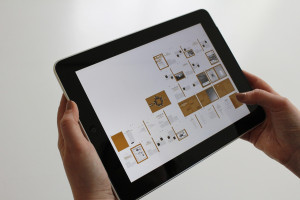Dr Noeline Wright
Project Dates: 2013 - 2016
 This project was about understanding the value in using a Teaching as Inquiry model, with teachers experimenting with mobile devices for learning.
This project was about understanding the value in using a Teaching as Inquiry model, with teachers experimenting with mobile devices for learning.
In partnership with the Wilf Malcolm Institute of Educational Research (WMIER) at Te Kuta Toi Tangata Faculty of Education, University of Waikato, a group of Hillcrest High School staff (mathematics, music, french) volunteered to trial iPads (and the Chromebooks) in their classes. Starting in 2013 with iPads as a shared device, these teachers were guided and supported by the researcher, Dr Noeline Wright. These teachers requested the continuation of the project, and it was expanded in 2015 to include teachers of science, physics, art and spanish.
Why was this research important?
The school wanted to know what they needed to know to become a Bring Your Own Device (BYOD) school
What were the main goals of the research?
- to investigate BYOD in specific classes
- to use action inquiry to frame teachers' own pedagogical focus
- to understand teacher, infrastructure, pedagogical needs to support BYOD
What were the key finding from the research?
- responsive IT support is a necessity
- clear infrastructure/systems are needed for managing wifi connectivity, decisions about devices, security (of devices and digital data)
- pedagogical knowledge development is key to successful classroom use
- teachers may use digital tools and processes that suit existing pedagogical orientations
What groups or organisations would be most interested in this research?
Teachers, schools aiming to become Bring Your Own Device (BYOD), researchers, policymakers and parents
What are the implications for:
Teachers
Teacher-centric pedagogical practices are not adequate for a digital classroom
developing technological knowledge as close to own practices as possible is highly successful
Pupils
Schools' security provisions are important to know about and use learning can be enhanced through digital technologies
Researchers
External agents can be successful in supporting teachers' pedagogical risk-taking and developing effective relationships in schools
Policymakers
Devices are not enough; pedagogical nous is critical for learners to develop effective thinking skills through digital devices
What was the main methodologies used to capture data?
Action Research as the framework for interviews (focus group and individual), classroom observations
From the outset, a Teaching as Inquiry model was a key approach of the project because:
- it linked to the New Zealand Curriculum expectations
- it supported the development of professional reflective practice
- it provided a common way to share and talk about experiences
- it linked to the school’s appraisal requirements
- it is a recognised educational research method as a version of action research.
A second approach was observation research. Generally, a fortnightly classroom visit occurred where the researcher observed the classroom teacher undertaking a lesson using specific digital technologies they had chosen for the learning purpose. This was most often followed by discussion about the lesson.
Publications
Wright N. (2016). Developing professionally: examining the value of an external agent to the professional growth of teachers experimenting with mobile digital technologies. Educational Action Research 1-16
Wright N. (2016). Developing digitally: A secondary school's progress to BYOD. DEANZ2016, Conference held at University of Waikato, Hamilton, New Zealand, 17 Apr 2016 - 20 Apr. Conference Proceedings, N. Wright, (Ed). There and back: Charting flexible pathways in open, mobile and distance education.
Wright N. (2015)Vignettes of pedagogical practices with iPads: Reinforcing pedagogy, not transforming it. International Journal of Online Pedagogy and Course Design 5(3),62-73
Wright N. (2014). Cowpads: Findings from a project using iPads as shared devices in a secondary school Australian Computers in Education Conference: Now it's Personal, Adelaide, Australia, 30 Sep 2014 - 03 Oct 2014. Australian Computers in Education Conference: Now it's Personal Conference Proceedings. Australian Council for Computers in Education. 365-369.
